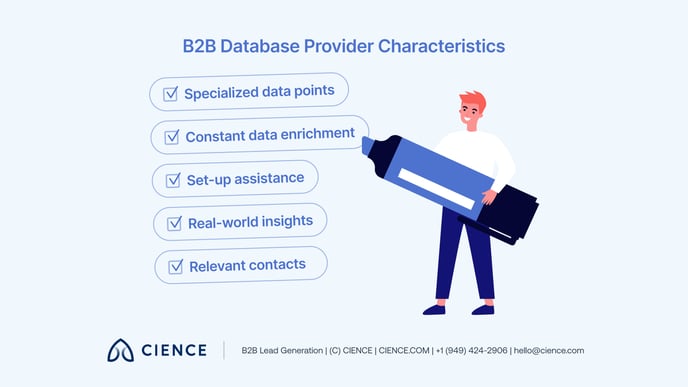Selecting the Right Database Provider for Your Organization Requirements
Key Features to Seek When Picking a Database Company
Selecting a database copyright is a crucial decision that can substantially influence your company's information and operations management strategy. Among the important functions to think about are scalability choices, which make sure that your system can adjust to expanding needs.
Scalability Options
When choosing a database supplier, comprehending scalability choices is vital to guaranteeing that the picked service can accommodate future development. Scalability refers to the ability of a database system to expand its capacity and efficiency in feedback to increased need. There are two key types of scalability: horizontal and vertical.
Upright scalability, or "scaling up," entails boosting a solitary server's sources, such as CPU, RAM, or storage space. This strategy can be straightforward and cost-effective for smaller sized applications but might reach a limitation where even more upgrades are too pricey or not practical.
Horizontal scalability, or "scaling out," includes adding more web servers to distribute the load. This strategy allows for higher flexibility and can fit significant rises in information volume and customer traffic (database provider). It is specifically helpful for cloud-based data source options that can dynamically allot resources based upon demand

Protection Procedures

When examining safety procedures, take into consideration the implementation of security methods (database provider). Data-at-rest and data-in-transit file encryption are vital to make sure that delicate details continues to be safeguarded, also in case of a protection breach. Furthermore, search for carriers that provide strong authentication systems, such as multi-factor authentication (MFA), to even more improve accessibility control
Routine security audits and conformity with sector requirements, such as GDPR or HIPAA, are indicative of a copyright's dedication to data protection. In addition, inquire regarding their case reaction plan; a durable strategy can minimize the influence of any type of potential protection occurrence.
Efficiency Metrics
Reviewing performance metrics is necessary for organizations to ensure that their picked data source service provider satisfies operational requirements. Key efficiency metrics include feedback time, throughput, and scalability, which jointly identify the efficiency of database procedures under differing lots.
Response time is critical, as it shows how quickly the database can process queries and return outcomes. Organizations needs to look for metrics that indicate average action times throughout top and off-peak hours. Throughput, usually gauged in transactions per 2nd (TPS), offers insight right into the database's capacity to handle high quantities of demands without performance deterioration.
Scalability evaluates the database's ability to expand with the organization's requirements. A robust database company ought to demonstrate horizontal and upright scaling capacities, enabling for seamless changes as needs fluctuate. In addition, comprehending latency, particularly in distributed systems, can aid companies evaluate the responsiveness of the data source across different geographical areas.
Consumer Support
Reputable consumer assistance is a cornerstone of reliable data source management, supplying companies with the help needed to optimize and deal with concerns performance. When picking a data source provider, assessing the level of customer support they use is necessary. A durable support system need to consist of multiple channels of interaction, such as phone, e-mail, and live chat, making certain that users can access assistance whenever they need it.
Additionally, receptive assistance groups that are available 24/7 substantially improve the integrity of the database solution. Motivate response times and find more information effective resolution of issues can significantly reduce downtime and boost total efficiency. It is likewise advantageous to consider the availability of dedicated assistance personnel, who can provide tailored assistance based on a company's specific requirements.

Prices Structure
When taking into consideration a data source copyright, the rates structure is an essential factor that can substantially affect an organization's spending plan and overall strategy. A transparent and flexible pricing model is necessary for straightening the data source costs with organization demands - database provider. Organizations should evaluate whether the pricing is based upon intake, per customer, or a flat price, as each design can produce various monetary effects in time
It is very important to evaluate any type of added costs related to the service provider's solutions, such as information storage space costs, purchase prices, and assistance charges. Some suppliers might supply tiered prices, enabling scalability as the organization grows, while others could impose stringent restrictions that can become costly as data demands enhance.
Moreover, organizations should think about the lasting worth of the data source solution. While reduced preliminary prices can be appealing, they might not account for future upgrades, upkeep fees, or combination expenses. Conducting a comprehensive cost-benefit analysis will certainly help identify the most appropriate pricing structure that stabilizes support, performance, and scalability, inevitably guaranteeing that the selected data source copyright aligns with the organization's monetary and operational goals.
Conclusion
To conclude, choosing a database provider necessitates careful consideration of numerous vital features. Scalability alternatives guarantee flexibility to future development, while durable safety and security procedures guard sensitive info. Assessing performance metrics makes it possible for the identification of effective data sources, and obtainable consumer support boosts the overall customer experience. A transparent rates framework better contributes Related Site to informed decision-making. By thoroughly assessing these aspects, organizations can make tactical options that align with their operational about his demands and long-term purposes.
Selecting a database service provider is an essential choice that can dramatically influence your organization's information and procedures administration strategy.When choosing a database service provider, recognizing scalability options is essential to guaranteeing that the picked option can fit future growth. When picking a data source company, reviewing the degree of consumer support they provide is crucial.When considering a data source company, the rates structure is an essential variable that can considerably influence a company's spending plan and general strategy. Conducting a thorough cost-benefit evaluation will certainly help determine the most ideal prices framework that balances assistance, performance, and scalability, inevitably making certain that the chosen database provider aligns with the organization's functional and economic purposes.